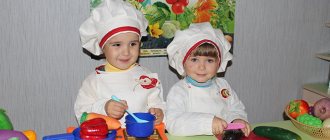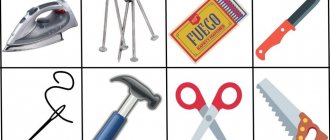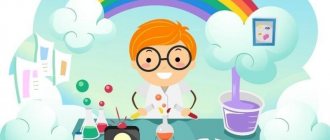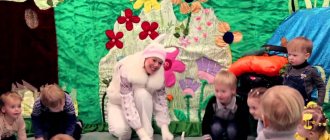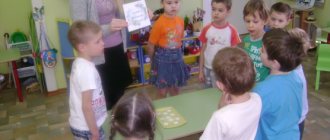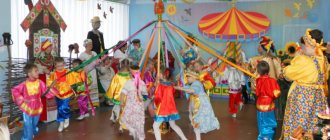Plot
First of all, we are talking about the plot content of the game. During the shift, the child experiences the development of the story that the authors put into their work. For a general epic game, the plot is the same for all ages, but the secondary scenarios may differ in groups of different ages. For example, stories about love, betrayal, and enmity can be found more often in senior units, because participants more easily distinguish the game from real life. They understand that just because one player attacked you during a game, this does not mean that he wants harm to you in real life. For preschoolers, for example, such stories are unacceptable.
Types of role-playing games
When talking about story-based games, many people only think of “mother-daughter games” or “war games.” These are indeed some of the most common entertainments, but they are far from the only ones. Children's imagination is capable of simulating hundreds of variants of unique “theatrical performances”, where everyone can try on the role they like and convey its peculiarity and character. There are a lot of story-based games; they can be divided into several groups: staged, social, everyday, patriotic and based on the plots of literary works. Let's take a closer look at each type.
Staged
In such games, the child himself comes up with a scenario and, as a rule, speaks for all participants in the production. The basis is taken from fairy tales, cartoons or real life situations. Children teach dolls to act in accordance with the role assigned to them, endowing them with imaginary characters. The production type can be described in one phrase - “You are your own director.”
Public
This type of entertainment reflects people's work activities. For these fun topics, the themes are taken from the surrounding life and are based on the knowledge that the child has managed to acquire. Hospital, kindergarten, school, post office, hairdresser, circus, theater, house construction, police, firefighters - the list goes on and on. To become full-fledged, such classes require special “props”: thematic kits for a doctor, policeman or fireman, tools for creating hairstyles, cubes for constructing structures.
Household
Kids love to play family. They happily babysit, raise “children,” and organize holidays and birthdays. Often during the game, through dolls, children express what worries or worries them, and show relationships in their family. Take a closer look and listen to what the child says and what emotions he experiences. Maybe it's time to adjust your behavior and remove negative aspects from communication with others. After all, it turns out that the “unreasonable” child understands everything and is very worried.
Patriotic
It's hard to find a boy who wouldn't love to play war and feel like a hero fighting enemies. Such fun is necessary for the development of masculine character traits, familiarization with the concepts of “honor”, “duty”, “conscience”, “fatherland”. Of course, for entertainment of this kind you will need a whole arsenal of weapons: from medieval swords to modern blasters. The more diverse the weapons are, the more scenarios can be offered to the little defenders of the humiliated and insulted. They will be able to become epic heroes and fight against “filthy monsters,” brave scouts, fearless soldiers from the Second World War, or liberators of an unknown planet captured by evil monsters.
Based on literary stories
In these games, children live out entire episodes from read fairy tales, movies or favorite cartoons. They imitate the heroes and try on the characters' characters for themselves. The Wolf and the Hare, ninja turtles, fairy-tale princesses and courageous liberating warriors - thanks to children's imagination, they easily move from the pages of books, TV screens, theater stages to apartments and become characters in role-playing performances.
Kindergarten teachers often use didactic games, offering preschoolers types of stories that include elements of teaching the rules of behavior in society. Such activities allow you to quickly assimilate social relationships characteristic of the adult world and develop the correct reaction to various situations. Eg:
- After playing in the hospital, children will no longer be afraid of doctors. Make-believe classes at school will give you an idea of the interaction between teacher and student, rules of conduct in class, and will help you overcome your fear of the teacher.
- A game that takes place in a cafe will teach you how to behave properly at the table. This entertainment will also give you knowledge of how to beautifully set a table and use unfamiliar utensils.
- When buying goods in a makeshift supermarket, kids will be able to do this in a real store, and will also understand what the profession of a seller is and learn the names of many products.
- It is easier to learn the rules of behavior on the street, get acquainted with traffic lights in a playful way, dividing the roles of the traffic police inspector and pedestrians between children of the older group.
The socialization of children is an important task that can be easily solved with the help of play activities, but their influence on the child is much deeper. You can get acquainted with toys based on fairy tales in more detail in the corresponding section of the site.
Organization
The organization of a role-playing game also suggests that the method of interaction between players may differ depending on age. So, in senior units, you can simulate activities during battles, medical operations, etc. A characteristic feature of younger guys is that their gameplay is largely quest-based, i.e. implies a linear progression of events prepared in advance by the masters. Middle age can carry out any gaming activity if it sees direct motivation for action. All these are conventions, but masters always take into account the age characteristics of the participants in their games.
An important element in preparing for role-playing activities is the stage of creating a role. Older players can quickly adapt to game conditions and immerse themselves in the life of their character, even if it consists of several sheets of personal introduction. The main way to get younger kids interested is to demonstrate some of the gameplay in action so that participants can get a feel for what they might enjoy about role-playing. Thus, in Ariadne’s Threads, before the start of plot-role interaction, shift participants play so-called small role-playing games. They are aimed at ensuring that each child can practice acting out his role, as well as understand what role-playing game itself is like.
Role-playing games for children of senior preschool age (5–6 years old) Card index of games for planning.
Irina Kulikova
Role-playing games for children of senior preschool age (5–6 years old) Card index of games for planning.
Source: Krasnoshchekova N.V.
Role-playing games
for preschool children .
Preschoolers in group develop the content of games. Various social relations and actions begin to be reflected. Games reflect the specifics of adults’ activities, their interactions at work, and their attitude towards work. The change in topics is associated with the expansion of their sources. Children reflect not only those events in which they themselves took part, but also those that they observed on excursions, walks, and everyday life. For this age, our task is to show how a role can be included in various relationships with other roles. The teacher often takes on an additional role. Gradually leads children to more complex changes to a familiar plot , then to inventing new plots .
Children are increasingly demanding of the quality of the role they perform. The main task of managing games is to develop their independence and self-organization, develop the ability to agree on the theme of the game , distribute roles, and prepare the game environment. Also, the teacher must constantly enrich the content of the games. It is advisable to use children's literature.
Card index of plot-role-playing games for older children
Game 1. “Family”
Goal: To encourage children to creatively reproduce family life in games. Improve the ability to independently create a game environment for a planned plot . Formation of valuable moral feelings (humanity, love, sympathy)
.Game material: Dolls, toy dishes, furniture, game attributes
(aprons, scarves, musical instruments, substitute items)
.
Playing roles: grandfather, grandchildren, mother, father, brother, sister.
Game2. "Shop"
Goal: To promote the emergence of the game , the unification of a series of stores into one (book, vegetable, clothing)
.
Game material: Construction material. Toys, dummies, cash register, mirror, display cases, dolls, wallets, substitute items, screens.
Game roles: sellers, cashier, buyers, driver.
Game "Journey"
Goal: To develop the ability to creatively develop the plot of the game . Getting to know the labor of a guard. Strengthening children's about the work of adults at the river station, on the ship. Consolidation and generalization of knowledge about the work of rural workers. Fostering a respectful attitude towards work. Getting to know the life of people in the North and South of our country.
Game material: Construction material. Technical toys - wind-up cars, map , motor ships, steering wheel, clothes for sailors, set “Road Signs”
, a set of toy animals and birds, substitute items.
Playing roles: Policeman, port master, cashier, salesman, captain, duty officer, boatswain, doctor, sailor, border guards,
Game "Factory"
Goal: Formation of the ability to creatively develop the plot of the game . Consolidation of knowledge about different types of transport: land, water, air. Expanding knowledge about the work of drivers, sailors, pilots. Familiarization of children with the work of the bus station, river station, railway station, airport. Expanding knowledge about blue-collar professions.
Game material: Construction material. Technical toys: wind-up cars, buses, boats, ships, planes, helicopters, trains, substitute items.
Playing roles: driver, passenger, builder, engineer, mechanic, technician, gas station attendant, washer, remote control operator.
Game "Pilots"
Goal: To develop the ability to creatively develop the plot of the game . Strengthen knowledge about air transport. Expanding knowledge about the work of pilots. Introducing the children to the work of the airport.
Game material: Construction material. Toy - airplane, propeller, wings, dolls, substitute items, clothing items, pilot uniform.
Game roles: pilot, flight attendant, controller, passengers.
Game "Russian Army"
Goal: To develop the ability to creatively develop the plot of the game . Formation in preschoolers of specific ideas about the hero-warrior, the moral essence of his feat in the name of his Motherland. Enriching children's about the feats of tank soldiers and sailors in their hometown (village)
.
Expanding children's of types of warships: submarine. Cruiser, missile boat, aircraft carrier, tank landing ship. Instilling in children a sense of patriotism , pride in their Motherland, and admiration for the heroism of people.
Game material: Construction material, caps, scarves, handbags, helmets, substitute items.
Game "Construction"
Goal: To develop the ability to creatively develop the plot of the game . Formation in preschoolers of specific ideas about construction and its stages. Consolidating knowledge about working professions. Fostering respect for the work of builders.
Game material: Construction material, helmet, substitute items, a set of equipment.
Game “Medical Center – Clinic – Hospital”
Purpose: Disclosure of the activities of medical personnel. Formation of the ability to creatively develop the plot of the game . Fostering respect for the medical profession.
Game material: screens, “Puppet Doctor”
, a set of dolls, substitute items, medical gowns.
Playing roles: teacher, cashier, controller, cleaner, veterinarian
Game "Mail"
Goal: Teaching children to implement and develop the plot of the game . Expanding and consolidating children’s about different forms of postal communication: mail, telegraph, telephone, radio. Cultivating a sensitive and attentive attitude towards comrades and loved ones.
Game materials: screen, postman's bag, postcards, mailbox. Children's magazines, wallets, pencils, envelopes, raincoat.
Library game
Goal: Encourage children to create a game plot , develop interest in the work of a librarian. Cultivating a caring attitude towards books.
Game materials: books, forms, pencils, cards , shelves.
Playing roles: librarian, readers.
Game "Factory"
Goal: Formation of labor skills, ideas about the professions of workers at our plant (factory), development of creative imagination. Cultivation of interest in the professions of their relatives.
Game material: sets of cars, pipes, passes, construction sets, gowns, helmets, mittens, a set of boxes.
Game roles: plant director, mechanic, worker, driver,
Game "Theater Studio"
Goal: Formation of positive relationships in the game.
Game material: screen, game attributes: money, tickets, wallets, “Cashier”
,
“Theatre”
, sets of different types of theater
(a set of soft toys, a set of masks.)
Game “Zoo”
Goal: Formation of skills to creatively develop the plot of the game . Cultivating a kind attitude towards animals.
Game materials: homemade products, animal sets, construction kits, natural materials, waste materials.
Game "Hairdresser-Beauty Salon"
Goal: Revealing the meaning of a hairdresser’s activity. Formation of the ability to creatively develop the plot of the game . Fostering respect for the profession of hairdresser, makeup artist,...
Game material: substitute items, real items (combs, curlers, brushes, bottles, mirror, “Children’s hairdresser”
, magazines, screen.
Game roles: Hairdresser (master, cashier, clients, cleaning lady.
The meaning of role-playing games
Regardless of what types of role-playing games your child prefers, they will help him prepare for the transition to a higher stage of development. This kind of fun not only captivates and entertains, it:
- They teach you to follow the rules. It is difficult for children to do what they don’t want to do. The desire to follow the rules will not appear on its own. Role-playing games will teach you this, because their essence lies in observing norms of behavior. By mastering the lives of adults, children begin to understand their moral principles, motivation and goals of activity. In addition, children develop a positive attitude towards people’s lives, their actions, and the rules of behavior in society.
- They form emotions. The child distinguishes fantasy from reality, this is confirmed by his words “pretend”, “really”, “as if”, but this does not prevent him from experiencing real emotions. Play activities reveal and shape children's feelings. Imagining herself as the mother of a “little child”, who is represented by a doll, the girl does not just repeat certain manipulations after her parents, but truly loves him. When a child acts as a hero who has completed an important task, he feels a sense of pride and responsibility for the task assigned. These experiences leave a deep imprint on the mind and shape the child’s emotional world.
- Develop intelligence. In the process of play activities, children of preschool age awaken interest in life events, professional activities of adults, and favorite heroes appear, whom they strive to imitate. Often the fun is not limited to one day, it is repeated several times. At the same time, the plot acquires new details and details. Thanks to this, children's thinking becomes purposeful and moves to a higher level of development.
- Train your imagination. Any children's game involves improvisation. The pre-conceived plot is filled with unpredictable twists: a captured enemy spy turns out to be “one of our own,” polar bears in the Arctic are eager to eat, and a princess getting ready for a ball urgently needs to put on makeup. The development of imagination affects the inclusion in the process of combinations from various life situations, elements from fairy tales or theatrical productions.
- Expand vocabulary. There is a two-way connection between speech and play. On the one hand, entertainment develops and activates speech, on the other, an increase in vocabulary makes the plot more interesting. The child uses words to designate his actions, which allows him to comprehend them, supplement them, and express thoughts and feelings. The development of vocabulary is especially significant in “director’s” productions, where you have to speak for all the characters in turn.
Children begin to be interested in role-playing games at about three years of age. At this age, children can already use objects not only for their intended purpose, but also according to an invented scenario. The sooner they begin to try on different images, the faster they will develop and enrich their activities. You can see how the complexity of entertainment changes as children grow older. Read more information about toys and their role in children's lives in our new article.


